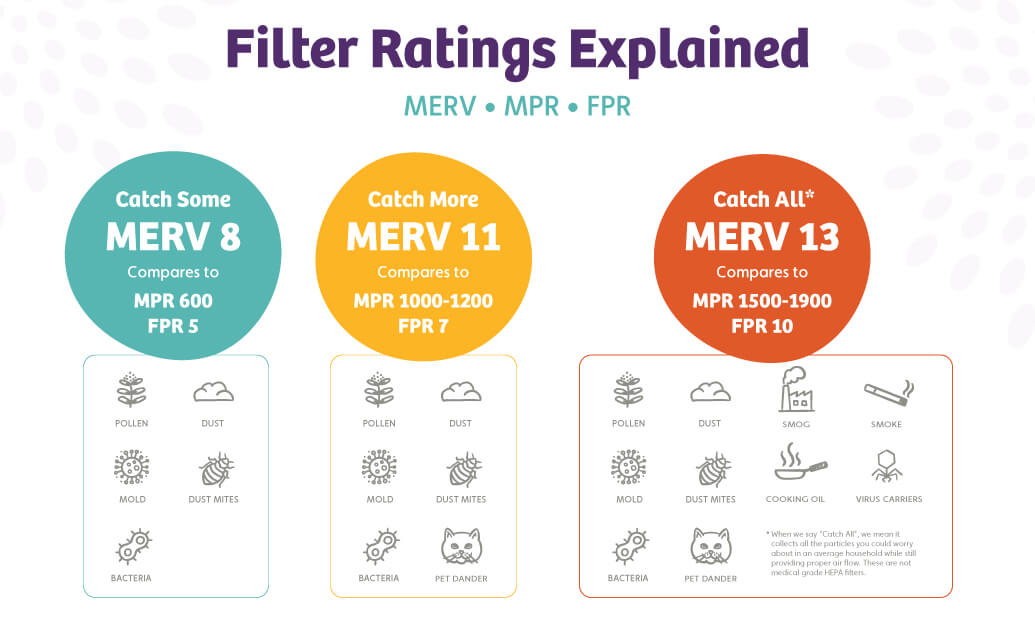Pleated filter? Fiberglass filter? Electrostatic filter? Which one is for me?
Pop quiz. What is the best way to rid your indoor air of pollutants like mold, pollen, and bacteria?
- Napalm your entire home
- Walk around the house waving a disinfecting wipe through the air
- Vacuum the air with a shop vac
- Purchase the right air filter
If you chose D, you are correct. If you chose any other option, then we need to have a separate conversation.
An air filter plays a critical role in keeping the air in your home clean. In fact, it’s the most important item to your home’s air that you can purchase, and since your indoor air can be up to five times more polluted than the air outside (and no one likes breathing pollutants), you need a high-quality air filter.
There are a lot of different varieties of air filters that you can purchase. Given that the average person ranks air filters right around different types of cement and how cardboard is made on the list of things that interest them, it’s not surprising that many don’t know what makes a quality air filter “quality.”
Luckily, all you have to do is read this one article, and you’ll have the answer to that question. Then all you have to do is sign up for Second Nature once, and you’ll never have to think about some air filters ever again.
What type of air filter should I get?
Filters can only be made so many ways. For home filters, you have three options. You can buy a pleated filter, you can buy a fiberglass filter, or you can buy a washable reusable filter. Each type has its disadvantages, and two of them have their advantages, so let’s take a closer look at what those are.
Pleated
Pleated filters get their name from their filter media, which is the material inside the frame that is responsible for the actual filtering. A pleated filter’s media is folded like an accordion to maximize surface area. Previously made of cotton, the pleated filters of today are built with synthetic polymers that allow for effective filtering while minimizing the impact on airflow.
The advantages of pleated filters include their high filtering efficiency. High MERV filters are almost always of the pleated variety. The pleated filters work to capture an extremely high percentage of large particles and a much higher number of small particles than competing filter types.
Pleated filters are low effort and high functionality. The only thing you ever have to do is remember to change them out, and they’ll keep pulling gunk out of your air.
Fiberglass
Fiberglass air filters are the cheapest on the market, sometimes costing less than a single dollar. There is a reason they are so cheap, and it is because they are garbage. Yes, fiberglass filters are garbage. Fiberglass filters are the weakest option and are recommended by the National Air Filtration Association only as “prefiltering” devices because of how ineffective they are. Simply put, they are bad at their job.
There’s a myth that fiberglass filters are better for your HVAC system because they allow for more airflow. While they do allow for that, advancements in HVAC and filter technology have made the difference immaterial. The extensive amount of pollutants they allow to flow through can actually make them more dangerous to your system than the pleated variety.
The reason why fiberglass is often recommended is that people don’t remember to change their filter. As a pleated filter loads with pollutants, it can eventually decrease airflow to a critically low amount. Fiberglass doesn’t do this because of how woefully ineffective it is at actually catching particles. So as long as you’re regularly changing your filters, there is not a single advantage to the fiberglass option.
Washable Electrostatic
Washable electrostatic filters are metal-frame filters that are designed to be washed and reused instead of replaced. The price range for these is wide, with the most expensive ones entering the $90 range.
The advantage with these filters is their longevity. While they do eventually wear out, they can be reused for multiple years before that happens. The disadvantage is that you do need to wash them routinely and let them dry completely before reinserting. This can eat into your busy schedule as they don’t dry instantly, and if your washable filter doesn’t fully dry, mold growth can be a real issue.
Washable filters also do a poor job collecting large particles. Because static electricity is really the only filtering mechanism they use, they struggle to attract the larger particles that are more difficult to pull with a charge. Thus, washable filters tend to work in reverse of fiberglass as they let larger particles through and filter out smaller ones.
What quality of filter should I get?
After you know what type of filter is right for you, you need to know what rating is right for you. Filters can be rated on three separate scales. The scale used by us at Second Nature and the official folks at the National Air Filtration Association is the MERV scale, which stands for minimum efficiency reporting value.
The MERV scale runs from 1-16. Second Nature offers filters rated at MERV 8, MERV 11, and MERV 13, which are our Essential, Essential+, and Health Shield, respectively. Anything below an 8 is something that probably shouldn’t be in your home. Anything above a 13 is not necessary except for maybe in an extreme case, which is why we offer the range we do.
Other filter scales include FPR and MPR, which stand for Filter Performance Rating and Microparticle Performance Rating. FPR was a scale developed by The Home Depot for the brands that it sells. The scale ranges from 4-10 and includes a color code for each range. MPR was developed by 3M and, it ranges from 300 to 2800. The scale is based on the filter’s ability to capture particles under 1 micron in diameter and is only found on 3M Filtrete filters.
Here we have provided a conversion chart with MERV vs. FPR vs. MPR so you can understand what you’re getting if you decide to purchase from somewhere that rates their filters with one of those less popular scales.

Deciding on what MERV rating is right for your home is a decision that must be made based on a handful of personal factors.
Are you an allergy sufferer?
More than 50 million Americans have some type of allergy. Allergies are everywhere, and if you’re among the millions of Americans who suffer from them, your filter can help you keep those nasty allergens out of your home.
The severity of your allergies will help determine just how critical filtration is for your home. If you have a significant allergy to something that is prominent in your area, you’re going to want to increase your indoor air quality with a Second Nature Health Shield filter (MERV 13) or equivalent level. More minor allergies or allergies to something that doesn’t exist in massive quantities around your home may allow for a drop down to a Essential+ filter (MERV 11).
Do you own pets?
Owning a dog or a cat introduces a whole new threat to your indoor air quality: dander. Dander is small flakes or bits of skin that fall off your furry friend when they shed, and some people are violently allergic to it.
If you are among that group, a Health Shield air filter is a must. Pet dander is small, and a MERV 8 filter is likely not sufficient for you allergy sufferers out there, and that fiberglass nonsense certainly is not. Essential+ and Health Shield will both be effective versus pet dander. If you’re allergic, get the MERV 13 Health Shield. If you’re not allergic, but you own pets, the Essential+ will work well for you.
Do you live in a polluted area?
Air outside your home will become air inside your home. It is inevitable. No matter how much weatherstripping you install or how well-sealed your home is, there will be particles floating around outside that will get inside. This is particularly important to remember if you live in areas that see a lot of air pollution from things like smog. Those of you in California, as you certainly know already, can get hit pretty heavily with photochemical smog in the summer. The state is often also hit with smoke pollution during wildfire season, which also runs through the summer and fall.
The particles that make up smoke are itty-bitty, smaller than a tenth of a micron. For perspective, you would need at least 3,000,000 of those particles lined end to end to equal one foot. If you frequently encounter smoke or smog around your home, a Health Shield (MERV 13) is recommended.
Still not sure what filter to get? Take our short quiz!
- Do you have allergies to pollen, dust, mold, or dust mites?
A. Yes, severe allergies (add 2)
- Yes, mild allergies (add 1)
- No (add 0)
- Do you own a dog or cat?
- Yes (add 1)
- No (add 0)
- Are you allergic to pet dander?
- Yes (add 1 if answer to #2 is A, 0 if B)
- No (Add 0)
- Do you live in a polluted area?
- Yes, very polluted (Add 2)
- Yes, slightly polluted and no smoke or smog pollution (Add 1)
- No (Add 0)
Answers
- 0 = Essential pleated air filter (MERV 8)
- 1 = Essential+ pleated air filter (MERV 11)
- More than 1 = Health Shield pleated air filter (MERV 13)
What size air filter should I get?
As the saying goes, there are three things you can’t pick: your parents, your name, and your filter size. That’s a real saying that we did not just make up eight seconds ago.
Simply, you need the filter size that fits in your air return. You can typically find that size on the side of the air filter that you already have in use. This size will be the nominal size, which means it is rounded from its actual size. This is the size you click on at secondnature.com.
If you don’t have a reference point from an old filter, you’ll need to use a tape measure and measure your vent. These measurements will be the exact size, and you’ll need to add ¼” to both length and width to get the nominal size.
If you have a filter that is four inches thick or thicker, you have a whole house filter. There is no rhyme or reason to how these filter sizes are rounded. Luckily, all you’ll need at secondnature.com is the actual size of the filter.
Buying an air filter isn’t always easy, and knowing what air filter to buy is the hardest part. However, if you have read this far, you’re good. So congratulations! Here’s an air filter gold star. You can print it out and tape it to your shirt if you want. You’ll probably get a lot of strange looks, but that’s not your problem.
Topics:




